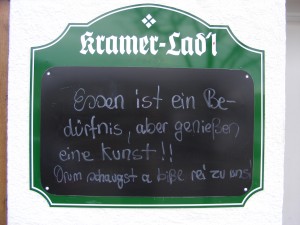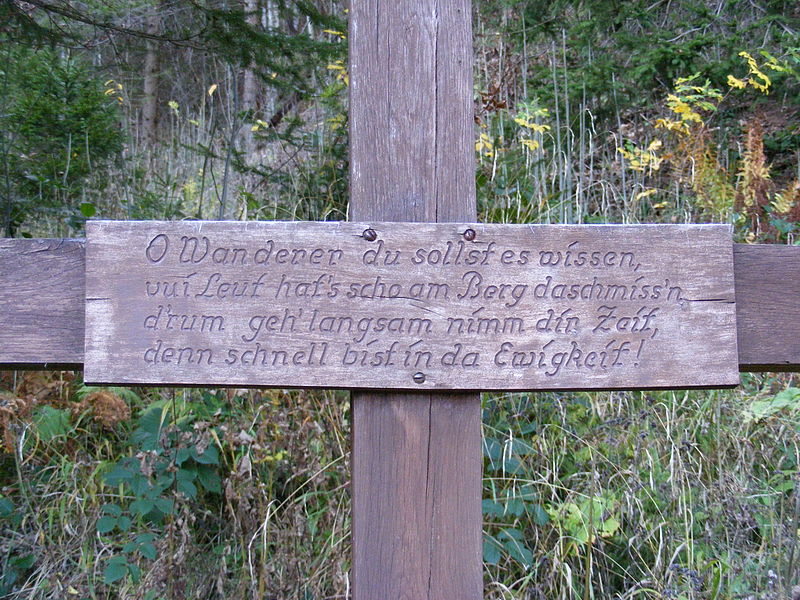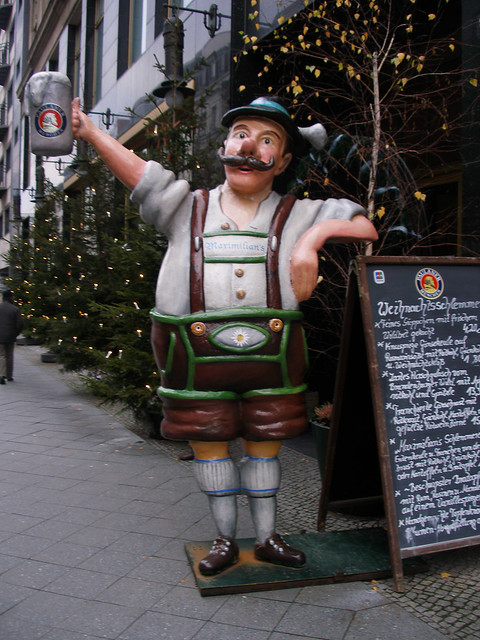Words and signs you might encounter in deepest Bavaria Posted by Constanze on Aug 10, 2014 in Culture, Language
If you visit Bavaria (especially if it’s a little place out in the depths of the Bayerischer Wald), you are likely to encounter the Bavarian language in one form or another. Spoken Bavarian probably sounds incomprehensible as a non-native German speaker, even if your Hochdeutsch is of a good standard. But when it comes to speaking, there are several things you could do to communicate with a Bavarian person, such as speak in Hochdeutsch (there’s a pretty good chance they’ll speak it back), or speak in English (there’s a reasonable chance they’ll speak it back), or use the age-old technique of pointing at things and hoping for the best.
When learning a language, people often focus on speaking as the most important thing, because they want to be able to communicate. But it’s important to know what you are reading, too. After all, if you speak to someone and don’t understand them immediately, you have ways of getting around that (as mentioned above). However, if you read something you don’t understand, what can you do then?
Although most things are written in Hochdeutsch across Bavaria, you will find some adverts, signs, and slogans written in Bavarian – especially if you’re in a more traditional and less touristic place. So if your German is good but your Bavarian is not so good, how will you know what you’re reading?
That’s where this post comes in! I’ve compiled a list of possible words, signs, adverts and slogans that you might see in Bavaria, to help you out with this. Please feel free to add to this list – I would love it to become an ever-expanding resource for people!
TOILETS
Need the toilet? In German, you know which word you’re looking out for on the toilet door. It might say Mädchen and Junge – girls and boys. Or maybe Damen and Herren – women and men. But what if you were confronted with two toilet doors, one saying “Madls” or “Dirndls”, and one saying “Buam” – and with no little pictures to tell you which is which? Have no fear, here’s the answer!
MADLN: Women
DIRNDLN: Women (a variation that refers to the traditional Bavarian Dirndl dress)
BUAM: Men
You may see this written on toilet doors in traditional restaurants, cafes and shops in Bavaria. Now you know which is which!
FOOTBALL
Bavaria is home to FC Bayern München. Their slogan or motto is “Mia san mia”, which is, naturally, Bavarian. As it is now a famous slogan, you may see it in all sorts of places, either in reference to football or not. So, to clarify:
MIA SAN MIA: Originates from the German “Wir sind wir”, which means “We are we” in English. It basically means, “We are who we are”.
RESTAURANTS

„Rottach-Egern – Kramer Lad’l – Essen ist ein Bedürfnis“ von User:Mattes – Eigenes Werk. Lizenziert unter Public domain über Wikimedia Commons –
A restaurant is one place you’re likely to find lots of Bavarian words, as they like to keep things traditional and homely. The above sign is just one example. The first sentence is in Hochdeutsch (standard German), whereas the second is in Bavarian.
“Essen ist ein Bedürfnis, aber genießen eine Kunst!!” – “To eat is a requirement, but to enjoy it is an art!!”
“Drum schaugst a bißl rei zu uns!” – “That’s why you should come in and see us!”
Here are some more words and phrases you might see in/around Bavarian restaurants and cafes:
AN GUADN!
This little phrase in German would be “Guten Appetit!” which you can probably tell means “A good appetite!” in English.
You are likely to see this little phrase plastered all over restaurant menus, and maybe hanging on a restaurant wall. Now you know what it means – the restaurant owners are wishing you bon appetit.
STUBN
A restaurant is sometimes called a ‘Stube’. For instance, you might see the name of a restaurant as ‘Schmankerl Stube’ or ‘Alpenglow Stube’.
Some places use the Bavarian word for Stube, instead – Stubn (or Stub’n).
So if you come across a Stubn, don’t be confused – it is, in fact, a Stube – a restaurant.
SCHWAMMERL (or: SCHWAMMAL)
The Bavarian word for ‘mushrooms’. In Hochdeutsch, this would be ‘Pilze’. So if you see a Schwammerlsuppe (or, even more Bavarian: Schwammerlsubbm) on a menu, you’re looking at mushroom soup.
I did not even know the word ‘Pilze’ existed until a few years ago. I had used ‘Schwammerl’ my whole life, and thought that was the standard German word for mushrooms! That’s how common the word Schwammerl is over there.
SCHMANKERL
Another word you may see on a menu, ‘Schmankerl’ is Bavarian for ‘Spezialität – ‘speciality’.
SUPERMARKETS
Kaufland, a German supermarket chain, has advertising slogans written entirely in Bavarian. One of them says “Joa servus. Kaufland is do!” Translation:
In Hochdeutsch: Ja hallo, Kaufland ist da!
In English: Well hello, Kaufland is here!
THE BAVARIAN FOREST
Since you might be out in the sticks of it when coming across many of these words, I thought I should briefly touch upon the Bavarian Forest. In German, we are talking about the Bayerischer Wald. Although you’ll mostly see it written that way, there is a chance you could see the word ‘Wald’ (forest/woods) spelt like this: ‘Woid’.
WOID is the Bavarian word for ‘Wald’ (forest/woods). If you ever see ‘Bayerischer Woid’ written anywhere, they’re talking about the Bayerischer Wald.
On a similar note, here’s one example of a sign written in Bavarian – presumably on a mountain somewhere.

„Spruch in Bairisch – O Wanderer du sollst es wissen“ von User:Mattes – Eigenes Werk. Lizenziert unter Creative Commons Attribution-Share Alike 3.0 über Wikimedia Commons
Can you figure out what it says?
And as always, feel free to add more examples in the comments!
Servus! Kemmts fei wieda! 😉
(Bavarian for: ‘Bye! Do come again!’)

Build vocabulary, practice pronunciation, and more with Transparent Language Online. Available anytime, anywhere, on any device.
About the Author: Constanze
Servus! I'm Constanze and I live in the UK. I'm half English and half German, and have been writing about German language and culture on this blog since 2014. I am also a fitness instructor & personal trainer.





Comments:
Nassos:
Also fur die Manner Buam,likes as something strong.Madln sounds like Madchen.I think that two words are more usually needed.Thanks Constanze for this compilation of Bavarian sayings.
Erika:
One word: Weng.
High Germans do not use this word, and I’ve been laughed at for it by High Germans.
Also, “Immer wen du meinst es geht ni’mehr, da kom von ergentwo ein lichtlein her.”
Constanze:
@Erika Hahaha, yes! “A weng”. This expression is totally normal for me, too. And I love the second one. I remember my mum telling me that one. Thanks for commenting. 🙂 x
Stacy Madl:
Hey recently found your site, love it!
Stacy Madl:
Sorry, my phone published my comment before I was done lol. Anyways so as I mentioned I love your site its so awesome, and thanks for this article, my dad told me he was pretty sure we are german and I always thought my last name which is “Madl” sounded German, and now thanks to this article I am much more confident in that lol. Anyways been obsessed with Germany and the language and happy that I’m pretty confident I have German in my blood 🙂 thanks for this post and keep up the awesome writing!
Constanze:
@Stacy Madl Hey Stacy! I’m so glad you like the blog! I love getting comments like this, they really brighten my day & remind me of why I write here. So thanks! Your last name is fantastic, you should find out if you have Bavarian roots! x
cliff1976:
Nice article!
I would have expected “du soist” instead of “du sollst” and “vui Leit” instead of “vui Leut.”
But that might just be my Oberpfälzisch exposure coloring my expectations…
Servus aus da Obapfoiz!
Constanze:
@cliff1976 Servus! Yeah, you’re right, where my family come from (Niederbayern) we also say ‘du soist’ and ‘vui Leit’… and I would have expected ‘schnei’ instead of ‘schnell’. But perhaps this sign was written in ‘Bairisch lite’ so that it wasn’t *too* difficult for others to understand 😉 Glad you liked the article! x